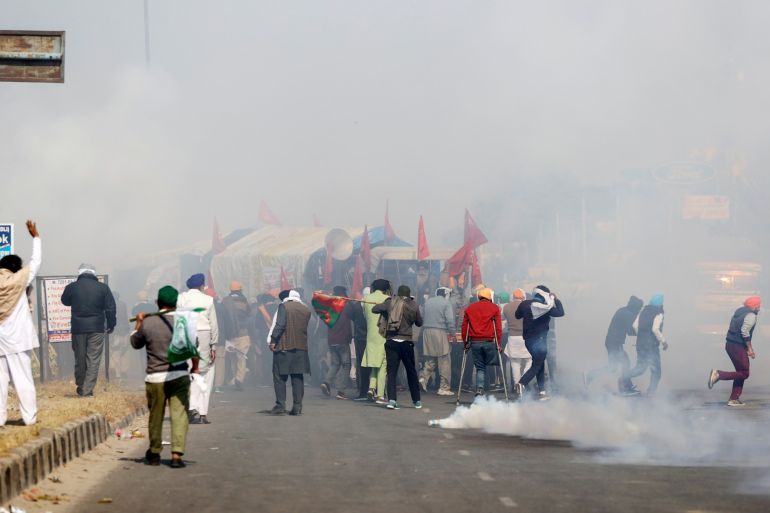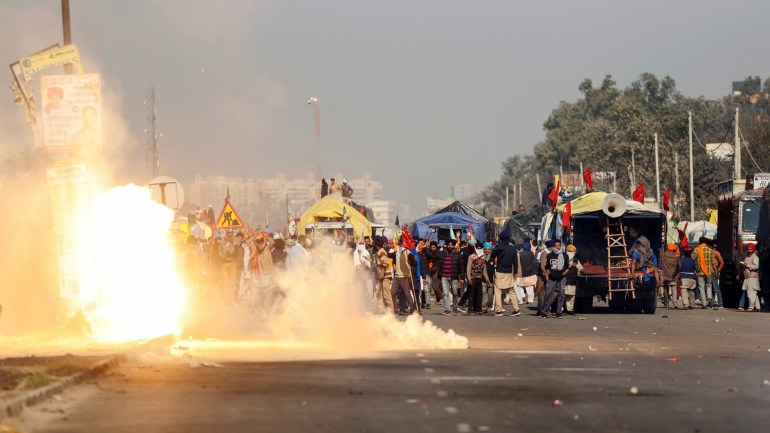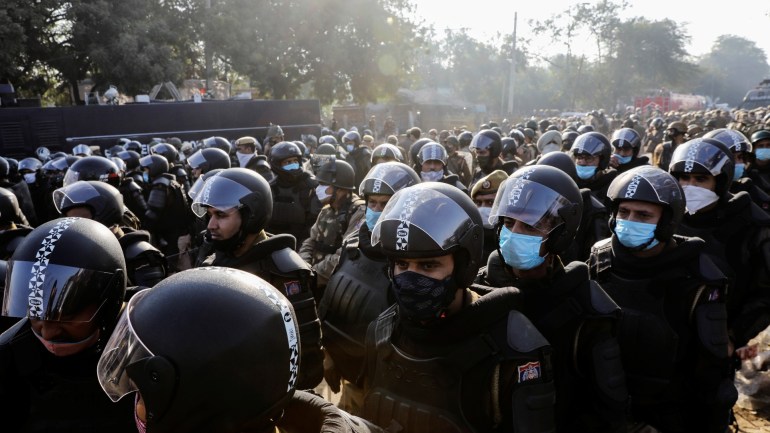Thousands of farmers march to Indian capital defying tear gas
Farmers are protesting against new laws passed by Modi government, which they fear will benefit corporations.

Thousands of farmers have entered the capital New Delhi for a planned protest against new farm laws hours after the police fired several rounds of tear gas and used water cannon to stop the Dilli Chalo (Go to Delhi) march.
Protesting Indian farmers scuffled with police earlier on Friday during the march to the capital, against new laws, which will make it easier for farmers to sell their produce directly to private buyers and enter into a contract with private companies.
Keep reading
list of 4 itemsWhy Indian farmers are protesting against new farm bills
India farmers brave tear gas as they protest against ‘black laws’
Indian farmers block roads, railways over farm bills
But farmers demand the bills, passed by India’s parliament in September, be scrapped fearing the laws will leave them vulnerable to big corporates.
A Delhi Police spokesperson confirmed to Al Jazeera the farmers have been given permission to enter the national capital and hold a peaceful protest at the Nirankari Samagam Ground in the Burari area.
“The farmers have been granted permission to enter Delhi. They can protest peacefully in a ground in Burari area” Anil Mittal, Additional PRO (Delhi Police), told Al Jazeera.

However, farmers from several states and trade unions, who wanted to stage protest in the Ramlila ground in the heart of the city, have yet to comment if they would agree to the new venue.
Television footage showed plumes of smoke and some people throwing stones at police as thousands pressed against barricades, waving flags and sticks. Some rode tractors near the barriers.
‘Not acceptable’
A farmer leader Jagmohan Singh told Al Jazeera over phone from Haryana border that they have been given permission to come to New Delhi but that he did not agree with the conditions set by the authorities.
“The government wants us to come to Delhi, organise a protest rally and return back. Such conditions are not acceptable to us,” he said.
Sukhdev Singh, another farm leader, said the new venue – Nirankari Samagam Ground – where they have been given permission to hold their protest, is not acceptable to them as it is too far from the city centre.
“All the major rallies in New Delhi happen either in Ramlila Maidan or at Jantar Mantar. Why can’t the government allow the farmers to hold their protest at these two venues [instead of telling] us to go to the city outskirts,” Singh told Al Jazeera over phone.
“We will not hold our protest rally in the Nirankari Samagam Ground at any cost.”

Thousand of farmers who have been travelling by tractors, buses and on foot from the northern state of Punjab towards New Delhi are still on their way.
A small group of farmers have reached the national capital and gathered at the Nirankari Samagam Ground, where a large contingent of police force is already present.
Gurnam Singh, a farmer from Punjab, told Al Jazeera at the Nirankari Samagam Ground that they are “very unhappy” with the venue. “We will hold our protest either at Ramlila Maidan or Jantar Mantar.”
“If the government doesn’t grant us permission to hold our protest at our desired venues, we will block the roads of the national capital.”
Meanwhile Indian media reported that India’s Agriculture Minister Narendra Singh Tomar has requested the farmers to end their protest against the farm laws and called them for talks next week to resolve the matter.
Suburban train services into New Delhi were suspended, Delhi Metro said in a post on Twitter, in a bid to stop the protesters from riding the trains.
Senior journalist P Sainath slammed the government’s decision to use security forces against farmers.
“It’s barbarism. Using the border security force against your own people,” said Sainath, the founding editor of People’s Archive of Rural India, an online portal focusing on rural issues.
The clashes come a day after police in New Delhi’s neighbouring state of Haryana, governed by Prime Minister Narendra Modi’s Bharatiya Janata Party (BJP), used tear gas and water cannon to disperse the farmers who tried to march towards the capital.
The farmers, most of them from the northern state of Punjab, were able to break the police blockade and marched to the New Delhi border earlier on Thursday, but they were being held at the Delhi border.
Extraordinary scenes
Al Jazeera’s Elizabeth Puranam, reporting from New Delhi, said police are citing a record-high number of coronavirus cases in not giving permission to protest organisers, but that has not stopped thousands of farmers from neighbouring states trying to reach Delhi for the second day.
“We’ve seen more extraordinary photos today of farmers using tractors to remove trucks, which police are using as barricades.
“They are determined because they want the government to repeal laws they say take away guarantees prices around their produce and leave them at the mercy of private investors. This is a huge issue in India.”
Earlier a police request to use stadiums as temporary jails was rejected by the city authorities, according to local media.

Under the laws that Modi has called “a watershed for agriculture”, farmers are free to sell their produce anywhere, including to big corporate buyers, instead of at government-regulated wholesale markets where farmers are assured of a Minimum Support Price (MSP) – the price at which the government buys farm produce.
The laws also allow farmers to enter into a contract with private companies in a step the government hopes will bring private sector investments in the sector that has struggled for years.
BREAK- Tear gas shells fired at farmers at the Delhi-Haryana Singhu border.
I’ve seen atleast 8 rounds of tear gas shells being fired.
Police have moved forward to push farmers back. #FarmersProtest #Watch #दिल्ली_चलो pic.twitter.com/hRt1iTytxM
— Zeba Warsi (@Zebaism) November 27, 2020
Many farmer organisations and trade unions oppose the new law, saying it would leave small growers with little bargaining power. They also say they fear the government will eventually withdraw price support (MSP) for wheat and rice.
The government says there is no plan to eliminate the wholesale markets.
Agriculture accounts for about 15 percent of India’s GDP but employs nearly 60 percent of its population.
‘Rushed through the farm bills’
The government says the new laws are aimed at making the vast agriculture sector more efficient by freeing up farmers who want to sell directly to big retailers such as Walmart.
Critics, however, say the changes will end the purchase of grains at prices guaranteed by the government and leave farmers vulnerable to the market.
“They rushed through the farm bills and the labour bills. There was absolutely no reason to focus on the farm and labour bills at this time when you got a pandemic,” Sainath told Al Jazeera.
“They [government] did it because they thought this is the time to do it and these people [farmers] cannot organise and protest and that is how they pushed them through the parliament.”
The governing BJP party has accused the opposition Congress party, which governs Punjab state, of misleading the farmers.
“The opposition parties particularly the Congress party is misleading farmers about the laws. They are saying that MSP will be abolished which is not true, MSP is already existing even after the legislation was passed by the parliament,” Syed Zafar Islam, the BJP Spokesperson, told Al Jazeera on Thursday.
“We took the farmers into confidence before passing the laws.”
Agriculture Minister Narendra Singh Tomar told ANI, a Reuters affiliate, he had already invited farm leaders for talks next week.
Farmers in several regions of India, particularly in Punjab and Maharashtra state, have been facing a crisis in recent decades with a cycle of drought, failed crops and indebtedness.
In 2019 alone, 10,281 farmers and farm labourers committed died by suicide, according to government data.

Additional reporting by Bilal Kuchay from New Delhi